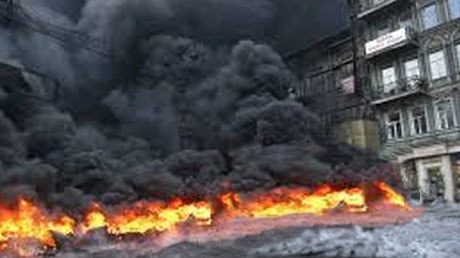The new "Berlin Wall"?
(Baonghean) - Interior Minister Vitaliy Zakharchenko said that peace negotiations with protesters were unsuccessful. He said the reason was because "extremist" groups and armed protesters did not show cooperation.
Protesters recently attempted to seize control of the Ministry of Energy, an action described by the authorities as a "terrorist act." This is one of the manifestations of the escalating crisis of protests that began in November. The protests are believed to be caused by the Ukrainian government's refusal to sign a treaty with the European Union under pressure from neighboring Russia. Last week, tensions increased after two protesters were reportedly shot dead by police during clashes at a protest site in Kiev's Independence Square. The authorities denied accusations made by protest leaders that police and snipers were behind the assassination. On Friday, the wave of protests spread across the capital and several regional administrative buildings fell under the control of the rebels.
 |
| The capital Kiev is in a state of tension after fierce clashes between police and protesters on Friday night and early Saturday morning. |
President Viktor Yanukovych has said he will do everything possible to bring stability back to Ukraine. But his opponent, Vitaly Klitschko, says the protests will not subside unless the president resigns. It is clear that the atmosphere in the country is becoming increasingly tense and is spiraling out of control of the opposition. The Interior Minister believes that the lives of citizens are being put in danger by the protesters as the forms of struggle become increasingly violent. In a press release on Saturday, he said: "The situation in Ukraine in recent days shows that all attempts by the authorities to resolve the crisis by peaceful means have failed. Our calls have not been answered and agreements between the two sides have been violated."
He also accused protesters of shooting a police officer and kidnapping three others. The press release came shortly after fierce clashes between police and protesters in Kiev on Friday night and Saturday morning. Specifically, Energy Minister Edouard Stavytsky said about 100 protesters tried to occupy the main building of the Ministry in the center of Kiev. After the Minister spoke to the protesters, they left the building but still blocked the entrances. Responding to reporters, he said, "What is happening is a direct threat to the energy system of the entire country." Meanwhile, protesters said the purpose of the above action was to prove to the government that no government buildings or bases are still safe.
While the situation in Kiev appears to be more or less under the control of the authorities, protesters have taken control of several important administrative buildings in the western provinces. This is also an area with closer ties to the European Union. In particular, in the western city of Ivano-Frankivsk, 1,500 protesters took control and barricaded themselves in the administrative building that controls the entire region. They are now putting pressure on the head of the local government, demanding his resignation. In Chernivsti, in the west, crowds rioted in front of the government building as police tried to protect it, shouting "Shame on you" and "Resign". In Lutsk, in the southwest, they organized a large protest. In Lviv, protesters surrounded the local administration building on Thursday. There are also reports that several members of the Berkut special police unit have resigned.
EU Enlargement Commission member Stefan Fuele said there had been dialogue with both sides and that the EU would support both sides in "de-escalating tensions in Ukraine and finding a way out of the crisis." The wave of protests was sparked by the Ukrainian government's decision to refuse to sign an association agreement with the European Union under pressure from Russia. However, protesters later claimed they were targeting corruption and abuse of power within the current government. The Ukrainian government denied these accusations and firmly stated that it would use all legal means to resolve the crisis.
It is impossible to look at today’s Ukraine without thinking of the Berlin Wall. East and West Germany, the two sides of the battle lines of two ideological systems in history, are once again being re-enacted, if not clearly. The current context may not be the same as that of Germany emerging from World War II, but the relationship between Russia and the European Union is certainly tense enough to push Ukraine into a dilemma. Where will the crisis in Ukraine go? It remains to be seen whether Russia will continue to pressure or loosen its grip on its neighbor, and whether the European Union will be eager to establish relations with Ukraine? Let’s see if a second Berlin Wall will be built!
Ganoderma lucidum






